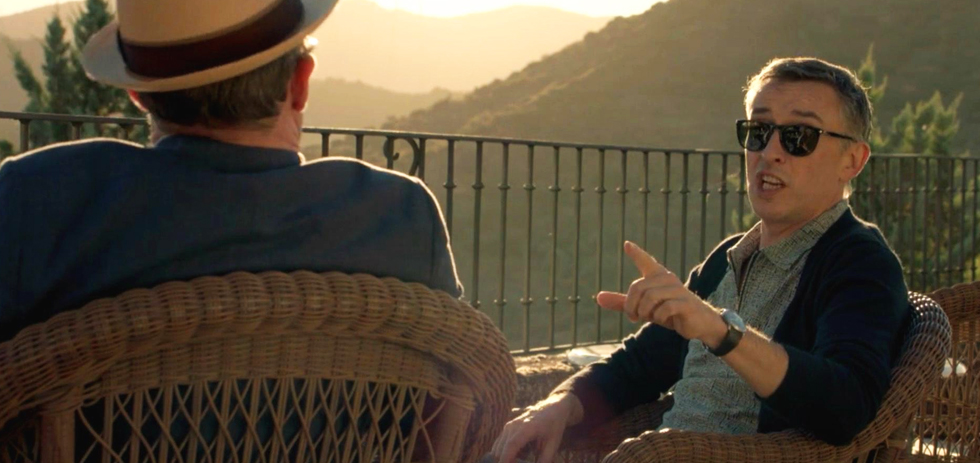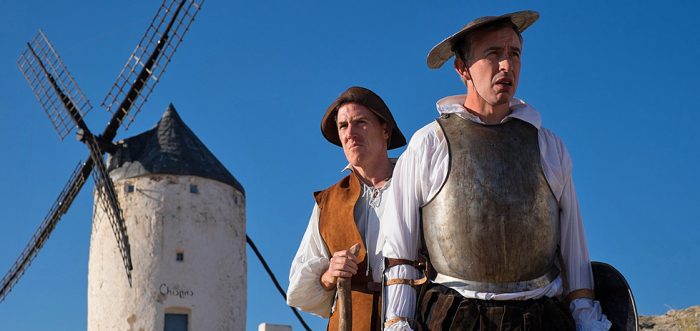
Have our intrepid heroes Steve Coogan and Rob Brydon come full circle — or even found a way out of the circle — only to find another circle? The Trip series seems to have set up a labyrinthine universe for its stars, especially Coogan: he’s depicted here as a kind of Llewyn Davis figure, going around and around in a circle within a circle, in a film that alludes to — and at times brilliantly realises — the Sisyphean existentialism that’s been quietly present in both previous chapters.
In The Trip to Spain, our two leads have finally become self actualised. Coogan, personified as a Don Quixote figure, is a wanderer who still remains trapped by the limitations of his ego, while Brydon, the Sancho Panza sidekick, is the goofball with no off switch. Lost in a kind of La Mancha, these two almost Beckettian fools seem to have hit an impasse. Coogan has met his Minotaur in the form of Hollywood, but he’s no Theseus. Brydon seems to have no desire to tackle America, and is settled now with his young family. And that, or so it appears, is that. Or is it?
Series director Michael Winterbottom has crafted a film that is the most cinematic of the trilogy, and by far the bleakest. Gone is the quasi-documentary and more personal style that was at the core of the first Trip; and the warmth, optimism and Byronic romanticism of its sequel, The Trip To Italy. Instead, he opts for a colder, more detached approach that outdoes even the first film in the melancholy stakes: a more static camera and wider frames (at one point there’s even a drone shot) that capture the sweeping, beautiful vistas of Spain. Strangely, you don’t get a strong sense of the place or space — rather, you get a sense of how these two characters are isolated in that space; the world is too big for them now, and their insignificance in the larger context of the universe has, by this third outing, been established beyond doubt.

There’s a finality to this third instalment, too, especially in the actors’ improvised impersonations that seem to have reached their zenith. It’s in these extended bits where Spain really sings. The strength of these films has always been the quixotic chemistry of our two cleverest uncles, and when Winterbottom lets them riff we see everything we need to see about them. Within these exchanges — which are allowed to spiral in this film, and often — Coogan and Brydon are saying everything and nothing about everything and nothing, but all we need to know about themselves. And it’s glorious, particularly in a sparkling riff on Roger Moore/The Moors (get thee to a Punnery, you clowns!) and an equally, if not more impressive closing gag in Picasso’s birthplace Malaga that involves Coogan and Brydon as the Welsh-accented Anthony Hopkins-as-Captain Bligh-as Picasso. It is inspired, not only for the dexterity and inventiveness of the performances but for what they are now saying about the universe our characters are inhabit. There are even two very worthy additions to the canon, this time from the rock ‘n’ roll world: a peacocking Mick Jagger and a spot-on early- and late-career Bowie.
As a side note, I promised myself that I wouldn’t start this review with the phrase “As an actor, I…” and I didn’t, but… as an actor… this film hit painfully close to home at times, and was excruciating to watch. Not in the bits where the boys are doing their thing, but when Coogan is talking to his agents in America and England. I personally could do with less of that… but that’s just me… as an actor…
The Trip chapters have been so many things: history and geology lessons, great studies in literature, acting and clowning masterclasses, meditations on middle age and growing old and masculinity in crisis — and all have been beautifully shot and realised, and of course genuinely very, very funny. The Trip To Spain is no exception. What began with the duo’s metatextual japery in Winterbottom’s Tristram Shandy has been brilliantly wrapped up: The Trip to Spain has taken the contrivance of The Trip world not only to its logical conclusion, but over its edge. And what a magnificent trip it has been. Time to go home now, gentlemen! To bed!
Henry Nixon is an actor. His film credits include Noise, Sleeping Beauty, Triangle and Somersault. His TV credits include The Pacific, NCIS, Underbelly, and The Kettering Incident, for which he won the Silver Logie for Most Outstanding Actor in a Television Series at this year’s TV Week Logie Awards. He lives between Los Angeles and Sydney.
